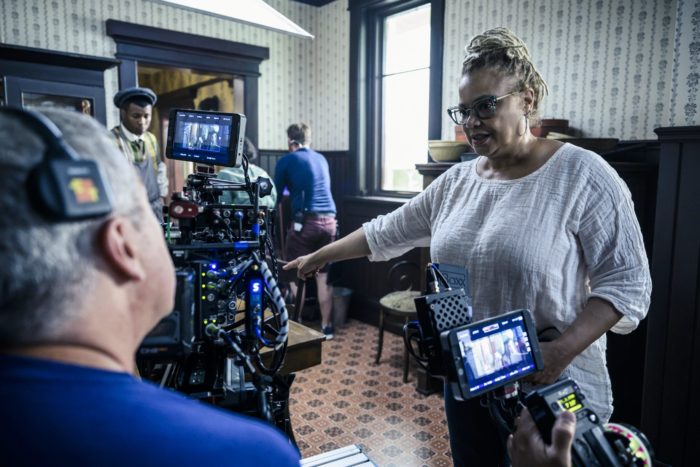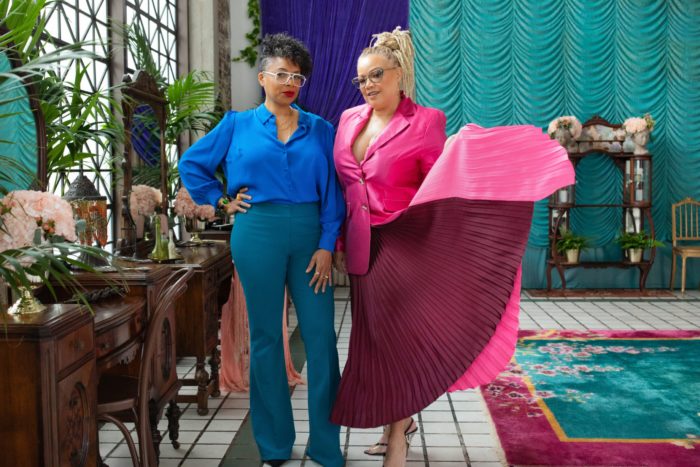
Kasi Lemmons is an American filmmaker whose pictures include Eve’s Bayou (1997), The Caveman’s Valentine (2001), and Harriet (2019). Her most recent work is as a director and executive producer on Self Made: Inspired by the Life of Madam C.J. Walker (2020), a four-part miniseries released on Netflix earlier today. The first two installments of Self Made are directed by Lemmons, and the last two are directed by DeMane Davis.
The program depicts the adult life of Madam C.J. Walker (Octavia Spencer), “the trailblazing African American haircare entrepreneur who was America’s first female self-made millionaire,” per Netflix’s synopsis. “Against all odds, Walker overcame post-slavery racial and gender biases, personal betrayals, and business rivalries to build a ground-breaking brand that revolutionized black haircare, as she simultaneously fought for social change.”
The following interview was conducted by phone on February 13. It has been condensed and edited for clarity.
DIG: Key to your work is the concept of visions—your characters experience them, and what they see becomes a separate plane of reality within the film itself. That’s true of Eve’s Bayou, The Caveman’s Valentine, and pretty much every movie you’ve ever made except maybe Talk to Me (2007). Could you speak about what draws you there?
In some ways it’s very much based on my black womanhood, you know what I mean? It’s very natural to me as a child of a big southern family, and as a black woman. I come from a family where my aunts had visions. It was part of my childhood. And I don’t know if this has to do with my childhood [specifically], but it’s somehow intrinsic to me.
Even before people started talking to me about it, there was this sense of having one foot in another world. That could be because I’m a writer, and the other world is my imagination. But for whatever reason, I’ve always thought in two worlds: A very concrete world, and then—we could call it a world of imagination, or a world of spirituality, or just… a less tangible world.
Also, I’ve got to say, my early influences in film and literature were Toni Morrison and Gabriel García Márquez. I was very drawn to magic realism.
You are a producer on Self Made, which is also built around this idea [each installment features a different recurring Walker-vision between most scenes]. Is that what draws you to projects in the first place, or is it something that you incorporate within stories you’re attracted to for other reasons?
With Eve’s Bayou, that was certainly how I imagined the film. But when you talk about The Caveman’s Valentine, Harriet, and the other films, the visions just came with the material. With Self Made, when [screenwriter] Nicole Jefferson Asher and I were first talking about it, that was the way she conceived it, that it would have interstitial breaks from reality.
But I was first drawn to the story of Madam C.J. Walker 20 years ago! I wanted to do a movie about her for a long time. And I had talked [back then] to A’Lelia Bundles [who wrote On Her Own Ground, 2001, the book on which Self Made is based], but the timing wasn’t right until this project came together around Nicole’s vision. Then I very happily came along!
Though each of your films is very recognizably yours, they also have their own genre signatures—Eve’s Bayou is talked about in relation to melodrama, The Caveman’s Valentine plays like a modern noir, and so on. On that level, or even just in a more general aesthetic sense, how did you approach Self Made?
I always thought that black hair—the subject of black hair—is deadly serious, but also playful. Black women are very playful with their hair. And there’s an exuberance to the whole idea of black hair as an expression of who we are. That has certainly transferred into our modern times. We can see Madam C.J. Walker’s legacy even now in that. So we wanted the show to be very expressive, and to contain that exuberance and playfulness.
You keep saying “we”: You’ve made feature-length films, and you’ve directed episodes for various television shows as well, but Self Made is something different and new for you—a miniseries helmed by two directors working collaboratively, albeit on their own individual episodes. Could you talk about the process of direction on a project like this?
With this show, I’m so proud of the fact that it was run by women, most of us women of color. It was pretty amazing. We have two fantastic showrunners in Janine [Sherman Barrois] and Elle [Johnson]. We have Nicole Jefferson Asher who created the show. I worked closely with Nicole, and then with DeMane Davis, who was the other director and the directing producer.
I directed the—quote—“pilot”. And the pilot director is the person who sets the look of the show, so in some ways that was on me. But having worked so closely with Nicole, I was trying to fulfill her vision of what she thought the show would feel and look like. We discussed that a lot together, and I discussed that a lot with DeMane and the showrunners as well.

You bring up the pilot, so to follow up on the visions conversation from earlier: During that episode we see interstitial scenes of Madam C.J. Walker in a boxing ring—getting hyping up, standing face to face with her enemies, and other things like that. From a directorial standpoint, how did you work to differentiate that from the “reality” of the story? Because it’s not like the scenes in the real world of Self Made are particularly realistic in the first place—like the visions, those scenes have an extravagant sense of color and costuming—but there is still a clear difference between the two.
We approached it the way that I approach subjectivity in general: Once you go into a character’s imagination, or subconscious, or visions—once you break from reality—then it helps to have a different visual approach. Talking about it, you think, What is she going through in her subconscious? What is she wrestling with? What is she fighting? How is her ego involved in how she sees this fight? And how is her history involved?
We decided that for her, this is a fight: She’s fighting her demons, her baggage, her own self, and this other ideal of womanhood. And she needs to prove that [other ideal] is not better than she is. She needs to prove that she’s better—or, just as good.
When you spoke about your director’s cut of Eve’s Bayou, you said that you regretted losing the elements you had to cut because they “said something to me about black families.” Self Made is a film about Madam C.J. Walker, but it’s also very much an ensemble drama about the larger Walker family. I wanted to ask if there were autobiographical connections in this material that meant something to you as well.
Obviously black families are a subject that is super interesting to me. Even doing Harriet—once I realized the Harriet Tubman story was really a story about family, then it became really important to me to bring her family into [the film].
In Self Made, Madam C.J. Walker is a very dynamic, very forward-thinking woman. Extremely ahead of her time. Self-motivated. Driven to succeed. And she has a vision of what her future can be that is completely outside the box [with regards to] the reality of African-American women in her time. How she copes with her family, how she copes with her marriage, and how her husband copes with her as a visionary black woman… I mean, even right now, many people consider a visionary black woman to be a very intimidating person, right? We still struggle with how the world treats us, and how to be accepted on our own terms.
She was decades and decades and decades ahead of her time. I was interested in the effect that had on her marriage. And of course that’s very relatable, even in a modern context.
Another very significant modern context I found myself thinking about with regards to Self Made is how it depicts the intersection of social justice and capitalism. That concern is very present in the film, and I think handled in an appropriately complex manner. From your own perspective, as a filmmaker who’s always made very personal work but has also remained in the commercial sector of the industry for most of their career: How do you feel about that dynamic?
I decided very early in my career that all my art was going to be protest art, whether or not anyone recognized that it was protest art. They’re statements I want to make about social justice. But done in my way, and in a way that I actually feel is very effective—to weaponize art, and to use it as a tool for revolution. And I think even presenting stories like Madam C.J. Walker’s, that’s revolutionary. She was a revolutionary woman.
We need to be able to look at our heroes like that. We need our Harriet, you know? To put her front and center, and to make you look at what a badass woman she was at the time that she was doing these things. That’s the way I look at it. I look at it as making a statement. Everything I do is making a statement.
Perhaps along these same lines, there’s numerous scenes in the miniseries where Madam C.J. Walker has to pitch herself to groups of white investors, which I have to imagine is something you’re all too familiar with. Throughout Self Made, Walker’s emotional and personal reactions—including the ones she has after those meetings—directly inspire business or “artistic” decisions made later. Is that an experience you’ve shared in any way?
Yes, I think in many ways I have. I always feel that that’s one of our superpowers as women: To allow our emotions and the things that happen to us to transform us. To take pain and oppression and bias and then allow that to make us stronger. And to allow our feelings about that to influence and inform our expression, how we relate to people—and how we make a claim for ourselves.

